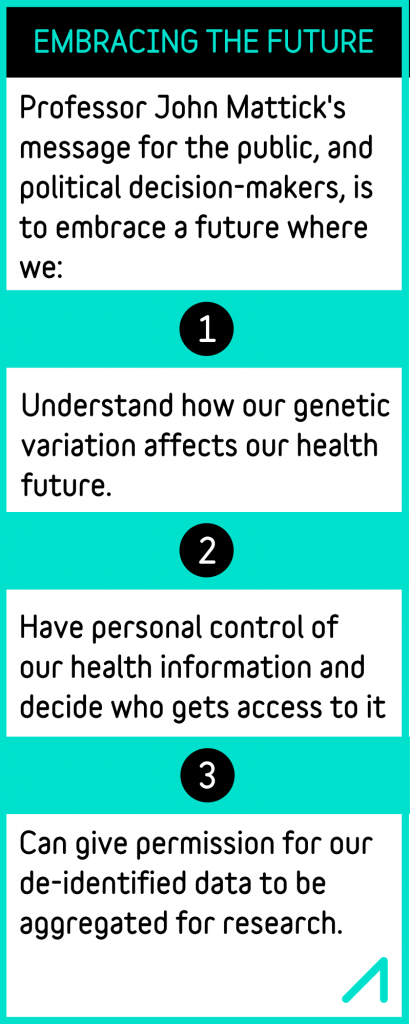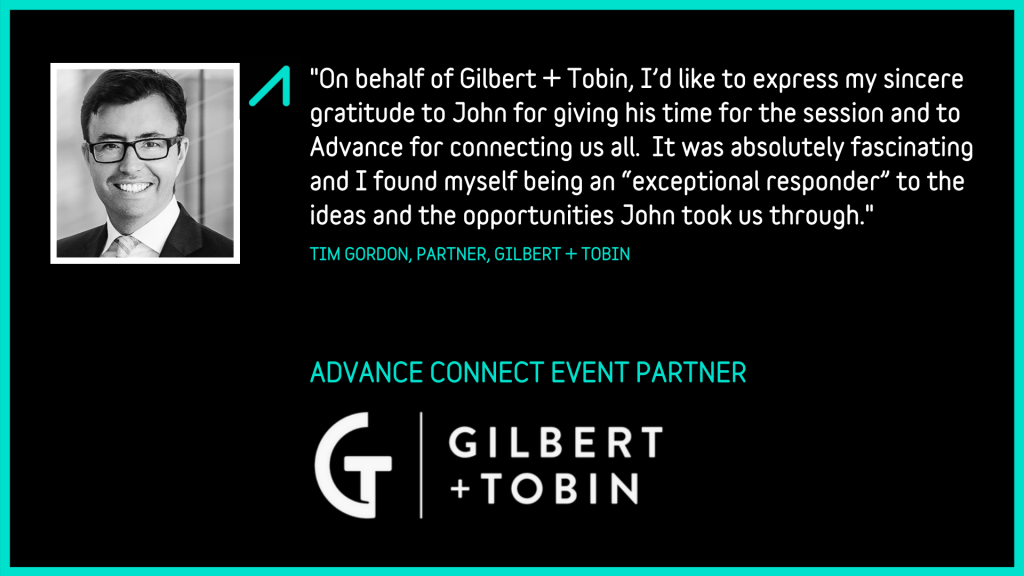WATCH > Professor John Mattick AO, FAA, FTSE conversation on the transformation of personal health and healthcare systems by genomics and smart sensors, and the challenges to overcome.

Professor John Mattick AO, FAA, FTSE, Advance Global Impact Award 2019 winner and one of the world’s foremost experts on the human genome, inspired participants to imagine the future of healthcare at our recent global digital roundtable.
In his mission to transform the healthcare system through genomics, John made a powerful case for broad-scale genetic testing and genome sequencing.
I used to think the 20th century was the century of biology and medicine because of the great advances in gene cloning and sequencing and so forth. But I was wrong. That was just the warm up. This is the century of biology and medicine and it’s going to be achieved through the analysis of big data. – Professor John Mattick AO
Change is within reach
He highlighted multiple areas where genomics can be used to identify and anticipate acute and general risks across the entire population:
- Identifying the causes and solutions for serious genetic disorders in children
- Identifying the specific mutations in cancer to inform effective treatment
- Understanding responses to prescription drugs to avoid adverse reactions and under-dosing
- Detecting early predisposition / presymptomatic signs of disease
With costs for genomic sequencing reducing from around $100,000 in 2001 to just $1000 today (and the promise of as little as $100 in the near future), John expects that personal genomic analysis will become routine in healthcare, and deliver transformative outcomes.
John reflected on the ideal population groups or disease types to benefit first from genomics. While genomic screening of cancerous tumours in children is becoming more widespread, he expects that soon it will be considered unacceptable and unethical for treatment assessments to be made without genome sequencing.
He pointed to the recent work of the Garvan Institute’s Professor David Thomas and colleagues, published in Science, continuing to advance knowledge of how to improve cancer outcomes through the use of targeted therapies. John expects a mix of sub-populations to offer significant scientific advancement while also demonstrating the value proposition of genomics, such as individuals with a family history of cardiac disorders or cancer, and a category of patients known as exceptional responders.
Benefits for all
Not only will many patients and their families be spared the current emotional burden of a lengthy process to reach diagnosis of serious disorders, but they will also see improved survival rates and quality of life from more effective treatments being identified.
Smart sensors on individuals — such as those to measure heart rate, physical activity, sleep patterns, blood samples — will provide real time physiological information and, combined with genome analysis, give early warning of risks.
Health economics analysis supports the widespread use of genomics, including reduced pressure on the healthcare system through faster diagnosis, more targeted treatments, fewer avoidable hospitalisations, and overall higher productivity from a healthier population.
The impact goes beyond the healthcare system, and he hopes Treasury officials will perceive its powerful influence on national productivity, the wellbeing of Australian citizens, and the possibility that Australia could participate in, and even lead, a once-in-a-generation major industrial transition. Importantly, Australia has established expertise in the field and few jurisdictions are yet to strategically invest in this opportunity.
What it will take
The path to precision medicine is not without its challenges. John reminds us that healthcare is the last of the great cottage industries, with a model of treating “to the average” because the intricacies of how humans differ from each other have never been understood. Until now.
1. Be clear about the value proposition
Incorporating the information in the human genome is financially viable and would deliver a seismic shift in the quality of diagnosis and treatment and reduce overall healthcare costs. But John says that fully integrating genomics and smart sensor data into the healthcare system will not happen without actively engaging the public and clearly articulating and promoting the value proposition. The social licence is critical.
The challenges faced recently by the Australian Digital Health Agency around introduction of electronic medical records demonstrates how quickly suspicion and negativity can undermine the delivery of major health projects. While privacy concerns are valid, the solutions to those issues also need to be communicated.
John emphasised the importance of sharing tangible examples of what can be done now using genomics, and shared several accounts – such as a toddler with a life-threatening tumour – with dramatically improved outcomes from precision medicine.
And while the democratisation of genetics may face resistance from clinical geneticists, the public has demonstrated their overwhelming appetite for personal genetic information, as shown by the exponential growth of direct-to-consumer genetic testing services.
2. Invest in critical infrastructure
Communication and engagement alone won’t deliver the transformation. John inspired the participants to consider it a national endeavour requiring a whole of government effort to build the necessary infrastructure, including:
- Highly secure databases
- Analytical systems that researchers, healthcare professionals and healthcare system managers can use to interrogate the data for personal health care, discovery and system management.
- Software systems that can deliver that information to the point of care.
3. Think differently
John emphasised that this transition won’t require a massive investment because many of the capabilities already exist. But it does require a different way of thinking about healthcare and changing the systems that perpetuate the current “illness” and crisis management model. He hopes that strategic efforts to transform the healthcare system will include lateral thinkers, who can imagine and harness the tremendous potential of this technology.

A life mission
Professor John Mattick AO is committed to building the infrastructure for the data future that drives precision healthcare by the use of personal genomic, clinical, pharmaceutical and physiological information. From the current disparate model of collecting, storing and accessing data, he sees a future where researchers, health professionals and health managers can use health data in an integrated and properly protected way.
In response to audience questions, John reflected on the value to insurance companies of genetic data (it should make premiums lower not higher), and the opportunity to incorporate consumer data into healthcare databases, given the high levels of data held by supermarkets and retailers.
John provided a powerful reminder of the bipartisan nature of healthcare decisions, the steps needed to pursue the national endeavour of making genomics central in the healthcare system, and reiterated the need to articulate the value proposition of genomics broadly.
Finally
John’s presentation was elegant in its simplicity and powerful in the clarity of his call to action. It is in all our interests to make decisions with accurate information, to improve outcomes for patients, families and the country as a whole. With a will to solve the problem, policy makers, users and clinicians can bridge any divide.
He highlighted the available market opportunities. Australia has the capacity to lead in further commercialising and retailing the offering, winning a sizeable share of the market and demonstrating once again, our ability to translate research into global commercial opportunities.
Advance.org board member Doug Ferguson chaired the event which attracted 55 registrations from members and friends of Advance.org, and was generously supported by Gilbert + Tobin.
Further information
About Professor John Mattick AO > More
Acceptance Speech at the Advance Awards 2019 > More
Interview with Professor John Mattick at the Advance Awards 2019 > More
How is the FDA Considering Regulation of Artificial Intelligence and Machine Learning Medical Devices? > More
Gilbert + Tobin: How can we help AI fight this virus and the next? > More
If you would like to learn more about UNSW Sydney, the Garvan Institute, or if you would like to donate to Australian genomics research efforts, please contact: UNSW Sydney: Daniel Martin – Director, Development (UNSW Medicine & UNSW Science)Division of Philanthropy (Alumni, Engagement and Development) at [email protected] or Mara-Jean Tilley – Director, Garvan Research Foundation at [email protected].
with thanks to our event partner Gilbert + Tobin

join advance.org
Membership is free